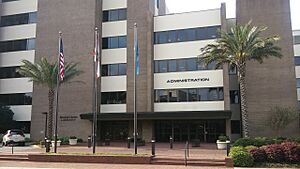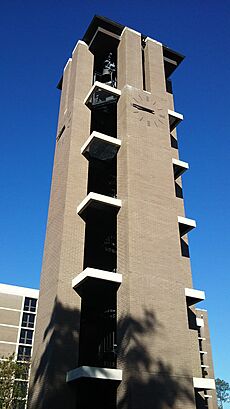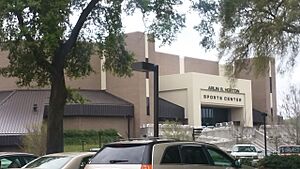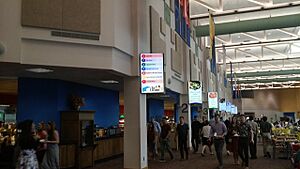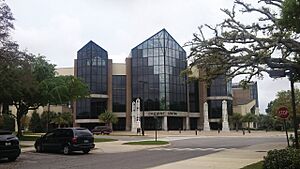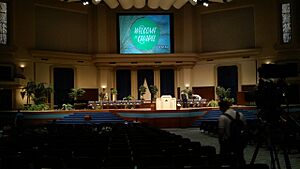Pensacola Christian College facts for kids
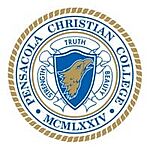
The official seal of the college
|
|
| Motto | Strength. Truth. Beauty. |
|---|---|
| Type | Private college |
| Established | 1974 |
| Founders | Arlin and Beka Horton |
| Accreditation | TRACS |
|
Religious affiliation
|
Independent Baptist |
| President | Troy Shoemaker |
| Vice-president | Jon Lands |
| Students | 4,882 (2017) |
| Location |
,
Florida
,
U.S.
|
| Colors | Blue, white, yellow |
| Nickname | Eagles |
|
Sporting affiliations
|
NCCAA Division II – South |
| Mascot | Eagor |
 |
|
Pensacola Christian College (PCC) is a private Christian college located in Pensacola, Florida. It was started in 1974 by Arlin and Beka Horton. The school is accredited, which means it has been checked for quality by an organization called the Transnational Association of Christian Colleges and Schools (TRACS).
Contents
History of the College
In 1952, Arlin and Beka Horton moved to Pensacola, Florida. They had graduated from Bob Jones University a year earlier. Their goal was to start a Christian school, and in 1954, they opened Pensacola Christian Grade School. This school is now called Pensacola Christian Academy.
Twenty years later, in 1974, the Hortons opened Pensacola Christian College. They wanted to provide "Education from a Christian Perspective." The college started with just 100 students in one building.
In 1998, the college added the Pensacola Theological Seminary for students wanting to study the Bible at a higher level.
Arlin Horton retired in 2012. Troy Shoemaker, who had graduated from PCC, became the new president. In 2019, Jon Lands became the executive vice president.
What Students Learn
PCC offers many subjects for students to study. These are grouped into nine main areas, including Bible studies, business, education, and nursing. Students can also study engineering, computer science, humanities (like history and English), natural sciences, and arts.
The college also has a graduate school for students who want to continue their education after getting their first degree.
Teaching and Science
PCC's education programs are designed to prepare teachers for Christian schools.
The college teaches that the story of creation in the book of Genesis in the Bible is literally true. This means they teach young Earth creationism, the belief that God created the Earth in six, 24-hour days. Because of this, science classes at PCC are based on creationism instead of the theory of evolution.
Accreditation
Accreditation is like a stamp of approval for a college. It shows that the school meets certain standards. PCC has been accredited by the Transnational Association of Christian Colleges and Schools (TRACS) since 2013.
For many years, PCC chose not to be accredited. The school leaders were concerned that an outside group might try to change the college's religious beliefs. They changed their minds in 2011 and earned their official accreditation two years later.
PCC does not accept money from the government for student financial aid. Because of this, it does not have to follow certain federal rules that other colleges do.
The nursing and engineering programs at PCC have their own special accreditations from groups that check the quality of those specific fields.
Life as a Student
Sports and Athletics
PCC's sports teams, known as the Eagles, compete against other Christian colleges in the National Christian College Athletic Association (NCCAA). The school has teams for men's basketball and soccer, and women's basketball and volleyball.
Students can also play sports just for fun with other students at the college. These are called intramural sports. They can play soccer, basketball, softball, and even broom-hockey. The soccer season ends with a big game called the Turkey Bowl every Thanksgiving weekend.
Fun and Recreation
The campus has many places for students to have fun. The Arlin R. Horton Sports Center has an ice skating rink, bowling alley, miniature golf course, and a weight room. It also has a surfing wave, a climbing wall, and an inline skating track.
The college also has another building with a swimming pool and tennis courts. For students who like the water, PCC has a West Campus with sailboats and kayaks.
Rules for Students
PCC has a lot of rules for its students. These rules cover things like how to dress, hairstyles, and keeping dorm rooms clean. There are also rules about the kind of music students can listen to and where they can go off-campus. For example, men and women are not allowed to ride in the same car to a destination without an approved adult chaperone.
The college has a system of demerits for breaking rules. If a student gets too many demerits, they might be "campused," which means they can't leave the campus for a while. In the past, students who were suspected of breaking serious rules could be "shadowed." This meant they had to follow a student leader to all their classes and activities.
Some people have criticized the school's strict rules. A former student once started a website to talk about the rules, but the college later took control of the website.
Faith and Beliefs
PCC has specific religious beliefs. The college believes that the King James Version of the Bible is the best English translation. For this reason, it is the only version used in church services and for teaching in the classroom.
Other Ministries
PCC is connected with several other organizations, which they call ministries.
Campus Church
The Campus Church is an Independent Baptist church that holds its services on the PCC campus. The services take place in the Crowne Center, a large auditorium that can hold 6,200 people.
Rejoice in the Lord
The services at the Campus Church are recorded and broadcast on a weekly TV show called Rejoice in the Lord. The show features music from the church choir and a sermon from the pastor.
WPCS Radio
The college owns a radio station, WPCS 89.5 FM, which is called Rejoice Radio. It plays inspirational music and Christian programs.
Abeka Publishing
Abeka, which used to be called A Beka Book, is a company connected to PCC. It creates and sells textbooks and learning materials for students from kindergarten through 12th grade. Many Christian schools and families who homeschool use Abeka's materials. The company is named after Beka Horton, one of the college's founders.
Abeka's science books have been a topic of discussion because they teach creationism. In a court case, a judge decided that the University of California system did not have to accept high school science courses that used Abeka's books. The judge said the books did not match what is generally accepted by scientists.
Famous Graduates
- Maria Boren: A contestant on the TV show The Apprentice in 2004.
- James Van Huss: A politician from Tennessee.
- John Libka: An umpire for Major League Baseball.
- Garrett Mason: A politician from Maine.
- Cathy McMorris Rodgers: A politician from the state of Washington.
 | Leon Lynch |
 | Milton P. Webster |
 | Ferdinand Smith |


